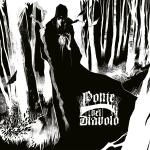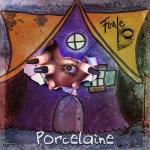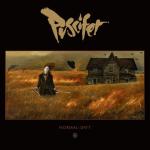For their second album, the Nancy-based duo -ii- (think of two eyes watching you in the dark and pronounce it ‘Two Eyes’) has undergone a transformation. Skin is a recurring theme in Apostles of the Flesh, in both concrete and symbolic ways. Now a quartet, the band is moving away from its trip hop-influenced darkwave sound to incorporate more earthy elements into its mix of influences with the arrival of David l’Huillier on drums and Maxime Keller (Dvne) on bass and keyboards.
The result is clear from the very first second of the album, as the tribal intensity of The Birth of Venus hits you right in the gut. The bass rumbles, the drums dictate its feverish rhythm, Hélène Ruzic chants and laments. While -ii- has lost none of its evocative power, continuing to crawl through mysterious occultism, its skin has thickened, covered with scales. The press kit tells us that -ii- sometimes seeks inspiration in maloya, a traditional music from Réunion, where Hélène Ruzic comes from. Skin, in the sense of identity: Ruzic and her long-time collaborator in -ii-, Benjamin Racine, previously had a Creole grunge project called Fournaise, their origins still feeding their work.
Identity, behind the spells, behind the hypnotic twists and turns, is at the heart of Apostles of the Flesh. Whether it's questioning one's sexual orientation, as in this first track, or evoking dysmorphophobia and dermatillomania (we'll let you Google those terms) in the following track, Digging for Blood, -ii- tackles intimate themes that stick to the skin or crawl beneath the surface of the epidermis. These personal questions are presented here in a poetic way, with mythological and literary references (Sisyphus, Helicon, Virginia Woolf's The Lady in the Looking-Glass, etc.).
We appreciate this new nervous energy that runs through the album, imposing a sense of anxiety, rage and visceral intensity. To make some easy comparisons, let's mention Nine Inch Nails from the late 90s crossing paths with Zola Jesus, GGGOLDDD and Portishead to create a bit of post-rock. The drums, sometimes timeless and esoteric, sometimes chaotic, are the framework onto which -ii-'s envelope is glued, a backbone with clinical industrial rigour (Lotis and its threatening cries, the shamanic Under the Skin – skin, again). -ii- gains an extra spontaneity, an immediacy that gives us the impression that the pieces are unfolding right there, close to us, for us, inviting us to be direct witnesses.
Around this rhythmic skeleton, machines and vocals are the soul of -ii-. Ruzic's tormented theatricality alternates between vulnerability, banshee screams that are as poignant as they are threatening, and a few recited words. While she is the mistress of ceremonies in this ritual, breathing life into it, the omnipresent machines are its ghosts, synthetic counterpoints to an organic sound enhanced by a production rich in elements, instruments, ideas and details.
Apostles of the Flesh is a long album, lasting over an hour. While it's easy to get lost in it at a time when music is consumed like fast food, quickly swallowed and quickly digested, -ii- deserves to be immersed in fully and rewards our commitment. Regularly, tracks renew our interest: the epic The Fountain of Helicon, a reference to the source of the Muses in Greek mythology, the twilight Sisters of the Coven, When Beauty is a Crime and its captivating funeral solemnity... The album is rich enough that exploring it is always a source of fascinating discoveries. On Apostles of the Flesh, -ii- exposes what's under its skin, questioning both the surface and what lies beneath, seeking to unravel its secrets in a timeless mystical theatre. The ancient is resurrected by machines, the ethereal and intangible are propelled into our existence with powerful beats of very concrete drums to which the listener can anchor themselves, and this intimacy becomes universal after crossing the ages. We leave the album with the spectral echoes of Virginia's Mirror, unreal and disturbing, a finale that calls for silence, as if to better allow -ii- to burrow under our skin and possess us a little longer.





